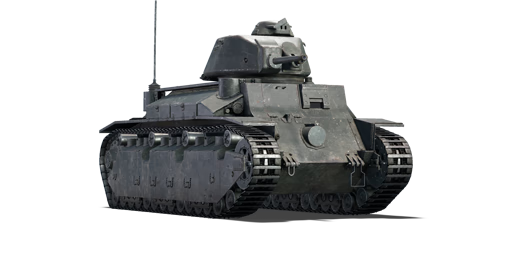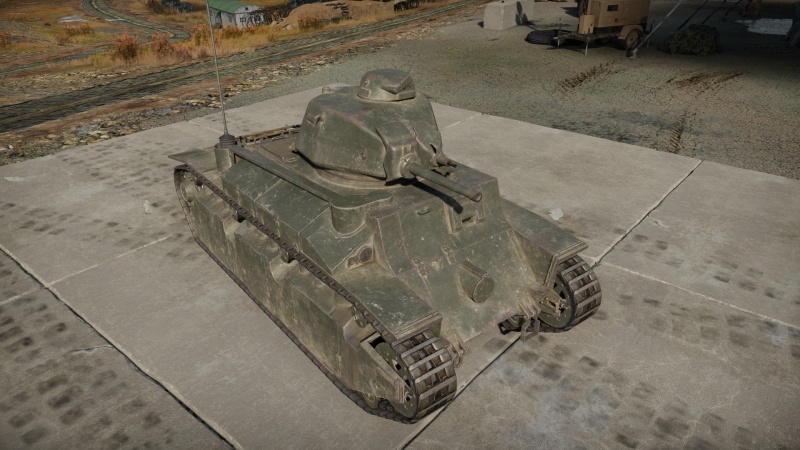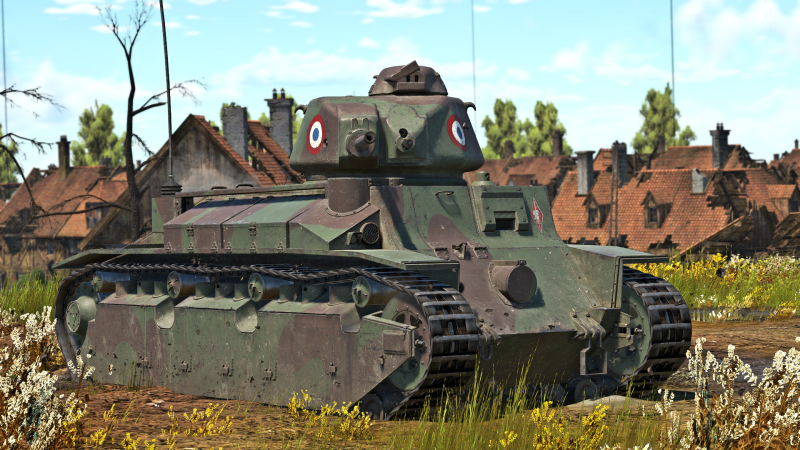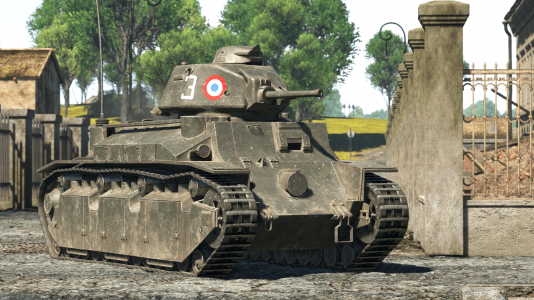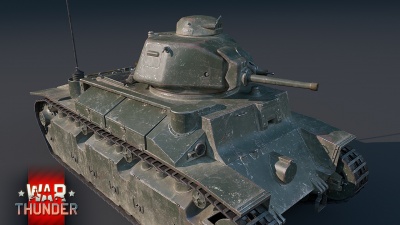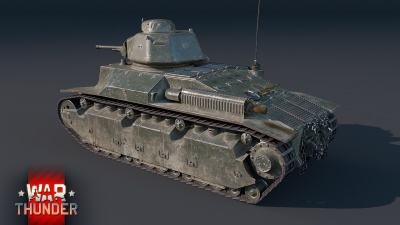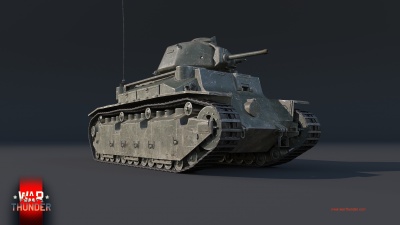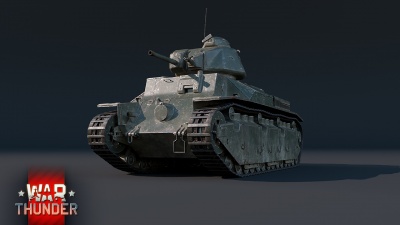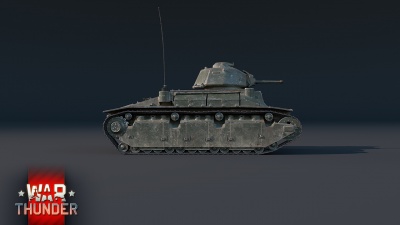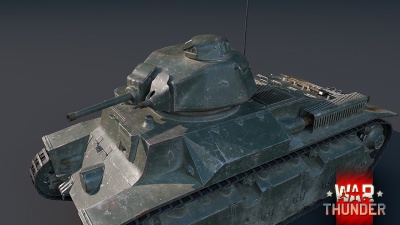D2
Contents
Description
The Char D2 was a French medium tank operated during the interwar period between World Wars I and II. While the Char D1 was ordered, a design was developed to create a more advanced tank. The Char D1 had already evolved from an infantry support tank to a medium tank capable of engaging and eliminating enemy tanks. This made it the obvious candidate as a replacement for the Char B1 heavy tank, as the latter was on the verge of being prohibited by an armament limitation treaty under the auspices of the League of Nations, which would impose a weight limit of twenty metric tonnes for armoured fighting vehicles.
Introduced in Update "Starfighters", the Char D2 should primarily be used as a support tank. In an offensive role, you help destroy approaching enemy tanks and capture objectives. Stay close to the frontline to maximize penetrating power from your main armament, but remain a safe distance from the major fighting zones to prevent being flanked or swarmed. When fighting enemy tanks, always angle to enhance frontal armour. However, since the armour is not thick enough to provide frontal immunity, it is vital not to linger out in the open. Stay close to an obstacle that you can use as a cover if you are hit and need to repair.
General info
Survivability and armour
Sporting 40 mm of rolled armour on all sides of a boxy hull, the D2 can be angled at a perfect 45 degree angle for a consistent effective thickness of at least 60 mm, presenting no obvious weak points save for the turret ring. The turret is of the same general style as used by the S.35 and B1 bis, with a small, strong 56 mm turret face reinforced by two gun mantlets and strongly angled 45 mm sides, making it very effective in hull-down positions. Still beware of enemies behind you and even strafing aircraft, as the low, sloped engine deck has two grilles with a mere 5 mm of protection that even SPAAs and heavy machine guns can penetrate.
The D2's ammo racks are located deep in the bottom of the hull, nestled behind the D2's extra suspension armour and the suspension itself, making them fairly well-protected.
Armour type:
- Rolled homogeneous armour (hull, sideskirts, turret ring, turret roof)
- Cast homogeneous armour (turret sides, gun mantlet, turret cupola)
| Armour | Front (Slope angle) | Sides | Rear | Roof |
|---|---|---|---|---|
| Hull | 40 mm (17°) Front glacis - upper part 40 mm (40°) Front glacis - lower part 40 mm (53°) Lower glacis |
40 mm Top 40 mm + 10 mm Bottom |
20 mm (72°) Upper plate (roof) 5 mm (72°) Engine vent (roof) 40 mm Centre plate 20 mm (58°) Lower plate |
20 mm Front part 5 mm Engine vent - front part 20 mm (18°) Rear part 5 mm (18°) Engine vent - rear part |
| Turret | 56 mm Turret front 45 mm Gun mantlet 45 mm Machine gun port 40 mm Turret ring |
45 mm (20°) | 30 mm (25°) Front part 30 mm Rear part | |
| Cupola | 40 mm | 40 mm (26°) | 40 mm (9°) | 30 mm |
Notes:
- Suspension wheels are 15 mm thick, bogies are 10 mm thick and tracks are 20 mm thick.
- Lower and upper turret ring armour are both 40 mm thick, and overlap slightly.
- Storage boxes, exhaust cover plate and mudguards are 5 mm thick.
Mobility
| Game Mode | Max Speed (km/h) | Weight (tons) | Engine power (horsepower) | Power-to-weight ratio (hp/ton) | |||
|---|---|---|---|---|---|---|---|
| Forward | Reverse | Stock | Upgraded | Stock | Upgraded | ||
| Arcade | Expression error: Unexpected * operator. | 232 | Expression error: Unexpected round operator. | __.__ | |||
| Realistic | 133 | Expression error: Unexpected round operator. | __.__ | ||||
The top speed is poor as the D2 is heavy: you will often arrive last. Neutral steering is possible and makes turning on the spot easy: this however works only when idle. Once on the move, the D2 will turn by locking a track. Accelerating and braking happen quickly. Turning doesn't make you lose much speed as your top speed already is slow. The reverse speed is a good point: it will get you out of a dangerous situation quickly. The D2 reaches 16 km/h when fording, 10 km/h when driving uphill with some speed built-up but a mere 4 km/h uphill from a stop. The tracks are quite large and grant you a decent mobility on hard (solid ground, roads) and soft terrain (mud, snow, sand). Light and medium obstacles (fences, posts, bushes and small trees) are not a problem for the D2 but large obstacles will reduce your mobility: avoid them.
Modifications and economy
Armaments
Main armament
| 47 mm SA35 L/32 | Turret rotation speed (°/s) | Reloading rate (seconds) | |||||||||||
|---|---|---|---|---|---|---|---|---|---|---|---|---|---|
| Mode | Capacity | Vertical | Horizontal | Stabilizer | Stock | Upgraded | Full | Expert | Aced | Stock | Full | Expert | Aced |
| Arcade | 120 | ±18° | ±180° | Shoulder | 9.5 | 13.2 | 16.0 | 17.7 | 18.8 | 5.20 | 4.60 | 4.24 | 4.00 |
| Realistic | 6.0 | 7.0 | 8.5 | 9.4 | 10.0 | ||||||||
The SA35 gun offers a reasonable penetration power at its battle rating. Its average muzzle velocity allows for a rather flat firing trajectory but the accuracy drop is noticeable from 700 m distance and becomes a handicap over 1,000 m. The rotation speed of the turret is slow compared to other tanks at the same rank or battle rating. Elevation and depression angles of the gun are important, allowing you to fire from unusual positions (behind a ridge, on a slope, etc.). Your recoil is nonexistent. The shoulder-stop stabilizer allows for a good targeting but at very slow speed. The reload times of the gun are in line with other light tanks at the same BR. The average penetration power and the absence of post-penetration damage from the solid shot are the biggest weaknesses of the armament. This will bring you to have to shoot enemy tanks repeatedly to destroy them entirely, while being in close proximity to maximize your penetration power.
Ammunition
The D2 has a limited choice of ammunition:
- Mle1935: APC; a solid shot with average penetration and no explosive filler. Make sure to target modules and crew positions to maximise the damage. Knowledge of enemy vehicle layouts is essential with this type of ammunition.
- Mle1935 HE: HE; useful for destroying open and very lightly armoured vehicles.
| Penetration statistics | |||||||
|---|---|---|---|---|---|---|---|
| Ammunition | Type of warhead |
Penetration @ 0° Angle of Attack (mm) | |||||
| 10 m | 100 m | 500 m | 1,000 m | 1,500 m | 2,000 m | ||
| Mle1935 | APC | 62 | 59 | 47 | 36 | 27 | 20 |
| Mle1935 HE | HE | 6 | 6 | 5 | 4 | 4 | 4 |
| Shell details | ||||||||||||
|---|---|---|---|---|---|---|---|---|---|---|---|---|
| Ammunition | Type of warhead |
Velocity (m/s) |
Projectile mass (kg) |
Fuse delay (m) |
Fuse sensitivity (mm) |
Explosive mass (TNT equivalent) (g) |
Ricochet | |||||
| 0% | 50% | 100% | ||||||||||
| Mle1935 | APC | 660 | 1.62 | - | - | - | 48° | 63° | 71° | |||
| Mle1935 HE | HE | 590 | 1.41 | 0.1 | 0.1 | 143 | 79° | 80° | 81° | |||
Ammo racks
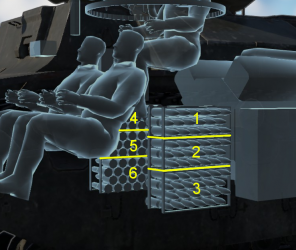
| Full ammo |
1st rack empty |
2nd rack empty |
3rd rack empty |
4th rack empty |
5th rack empty |
6th rack empty |
Visual discrepancy |
|---|---|---|---|---|---|---|---|
| 120 | 103 (+17) | 85 (+35) | 61 (+59) | 43 (+77) | 25 (+95) | 1 (+119) | No |
Notes:
- As they are modeled by sets of 3, shells disappear from the rack only after you've fired all shells in the set.
- Packing 25 (+95) shells is a good compromise to have enough shells at your disposal while reducing drastically the risk of ammo rack detonation.
Machine guns
| 7.5 mm MAC 31 | ||||
|---|---|---|---|---|
| Mount | Capacity (Belt) | Fire rate | Vertical | Horizontal |
| Coaxial | 3,250 (150) | 551 | N/A | N/A |
The small calibre of the MAC 31 machine gun makes it largely ineffective against all armoured vehicles but the ones with an open compartment. It still can be used to ping targets as a rangefinding help.
Usage in battles
- Combat tactics
The D2 should be played as a support tank. In an offensive role, you help destroying advancing enemy tanks and capturing objectives. Stay close to the frontline to maximize penetration power, while staying at a distance from enemy tanks (500-700 m) to avoid being flanked or swarmed. When engaging enemy tanks, angle your tank at 45° to maximize your frontal armour. In a defensive role, being at a distance from the frontline will force enemy tanks to drive in the open to get to you. Always play with a nearby obstacle you can use as cover if you get hit and need to repair. Have a planned retreat route as the enemy will try to use artillery or CAS to dislodge you from cover. A good player in a D2 can lock the enemy advance if positioned in a corridor and properly angled. If you try to use the D2 in a different role on the battlefield, you will quickly reach its limits: as a frontline tank, you will take shots from long range tank destroyers that will disable your tank. Your armour is not thick enough for tank destroyers with long guns. You will also be easily flanked by light tanks or armoured cars, especially if they swarm you. Only 1-on-1 engagements should be performed in this role. If you attempt to play long range engagements, your short gun will lack accuracy and penetration will greatly drop over distance. Even with your good gun depression allowing you to fire from behind the cover of a ridge, the slow muzzle velocity of your shells will make it difficult to aim at moving targets in the distance.
All in all this tank is quite similar in playstyle to the R.35 (SA38), with it being larger, slightly faster (though that is not a stretch), better armed and featuring thicker armour, making it a viable tank at its BR. If you employ the right tactics the D2 can become a solid wall stopping all enemy advances, making it impossible for the enemy team to push forwards unless they use air power to dislodge you.
- Notable enemies
Many enemy vehicles can destroy the D2:
- Long range tank destroyers that can defeat your armour from 1,000 m,
- Frontline and light tanks that manage to flank or get close to you,
- Tanks with HEAT shells,
- Tanks with many crew members: your ammunition having little post-penetration damage, knocking all crew members becomes lengthy.
These enemies are however not very ubiquitous and can be avoided or even neutralised if situational awareness is employed.
- How to defeat a D2
In a frontal encounter, shoot right in the middle of the front plate if the D2 did not angle its hull. This will knock out the gunner and the driver. If angled, aim at the turret ring. When flanking, aim for the spot right under the center of the turret or the turret ring (small area).
Pros and cons
Pros:
- Thick all-around armour, able to be heavily angled
- Good penetration power
- Shoulder stabilizer
- 3 crew members, granting better survivability than French rank I 2-man vehicles
- Quick reverse speed
- Neutral steering
Cons:
- Very low top speed
- No explosive filler for its AP shells.
- Poor turret rotation speed
History
Design
In 1926, the French Army expressed the need for a new battle tank aimed at replacing all Renault FT tanks. The company Renault proposed a design that would later become the Char D1. While the D1 was still in development in 1930, the French Infantry Command ordered Renault to design a heavier version of the tank: the D2. Like for the D1, the crew consisted of 3 members and the tank was equipped with a one-man Schneider turret. The D2 had to be better armoured and faster than the D1 but was heavier and offered a taller silhouette.
Development
The Char D2 was developed from 1930 to 1933, then tested and accepted by the French Army. Due to interference with the production of the Char D1 and delays in the delivery of Schneider turrets, the D2 was only produced in 1936-37 and later in 1940. The first tanks were equipped with a short 47 mm SA34 gun and the later ones were equipped with the long 47 mm SA35 gun. Shortly before the start of the war, the older tanks were retrofitted with a SA35. Around 100 tanks were produced.
Combat usage
The Char D2 fought during the battle of France in May 1940, most notably at the battles of Montcornet and Amiens. After the defeat, the D2 were scrapped. Only the turrets were reused as fortification guns by the Germans.
Devblog
Development of the Char D2 began in 1930, while Renault still worked on the Char D1 project. Unlike the Char D1 light tank, the French military requested the development of a heavier version of the vehicle, sporting thicker armour and better mobility, which was seen as an alternative to the Char B1 heavy tank, whose numbers were projected to become limited by possible arms limitation treaties.
Renault began work on the Char D2 and with the use of the then innovative welding technique, hoped to save weight and thus also cost of the new vehicle. The first prototype of the Char D2, called Renault UZ, was completed in 1932, followed soon after by two further prototypes in November 1933. Testing was kept relatively short, or in some aspects didn't happen altogether, in order to start production sooner. The first production orders were issued in 1934, with the first production models entering service with the French army in 1935. A second, improved production batch was ordered in June 1938, sporting a newer turret and improved firepower.
In service, the Char D2 was plagued by mechanical and reliability problems, leading to frequent breakdowns and difficult maintenance due to a lack of spare parts. Nonetheless, the Char D2 took part in actions during the Invasion of France in spring 1940 and served with French troops until the Fall of France in June.
Around 100 Char D2s were produced in total, of which many were lost as a result of breakdowns. Roughly 20 would be destroyed during fighting, with around another 20 vehicles being captured by the occupying German forces. The Char D2 did receive an official German designation, but was never put into service by German forces.
Media
- Images
- Skins
- Videos
See also
- Other vehicles of similar configuration and role
External links
| Renault | |
|---|---|
| Tanks | |
| Light tanks | AMC.34 YR · AMC.35 (ACG.1) · R.35 (SA38) |
| Medium tanks | D2 |
| Tank destroyers | AMR.35 ZT3 |
| France medium tanks | |
|---|---|
| M4 Derivatives | M4A1 (FL10) · M4A4 (SA50) |
| AMX-50 | AMX M4 · AMX-50 (TOA100) · AMX-50 (TO90/930) |
| AMX-30 | AMX-30 · AMX-30 (1972) · AMX-30B2 · AMX-30B2 BRENUS · AMX-30 ACRA · AMX-30 Super |
| AMX-32/40 | AMX-32 · AMX-32 (105) · AMX-40 |
| Leclerc | Leclerc · Leclerc S2 · Leclerc SXXI · Leclerc AZUR |
| Other | D2 · S.35 · Lorraine 40t |
| Germany | Panther "Dauphiné" |
| USA | ▄M4A1 · ▄M4A3 (105) · ▄M4A4 · ▄M26 |


